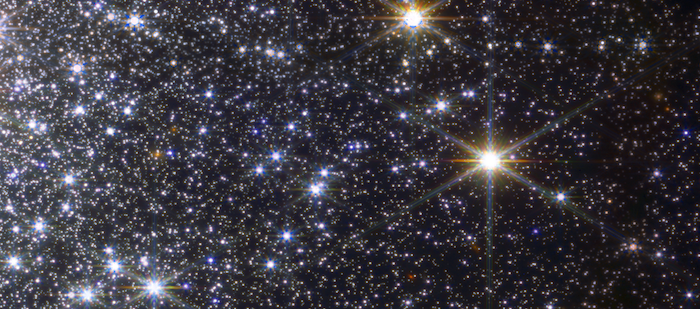
Globular Cluster M92, James Webb Telescope, NASA, ESA, CSA, Alyssa Pagan (STScI)
Show me a church’s songs and I’ll show you their theology.
— Gordon Fee, Professor Emeritus, Regent College, Vancouver, Canada.
Science may be sermonised in the classroom but we embody it in the field and the lab. Likewise, our Christian formation may be sermonised from the pulpit but we embody it in our participative song.
We learn much more by doing than by listening. From Mondays to Saturdays, on the bus, at the washing-up bowl, in that day-dream moment, in our leisure and down-time, a Sunday song is much more likely to spring to mind than a Sunday sermon.
It is in the liturgy, the work of the people, that this “doing” happens. And for us in the congregation, our “doing”, our formation, happens more, and for some mostly, through our active singing rather than our passive listening. We are what we sing.
But do we ever sing God-and-science?
Reflect on your church’s worship pattern. On the hymns, songs and psalm-settings that we choose and include. And on those we don’t choose, and thereby implicitly exclude. On our corporate prayers and responses. On the liturgical texts that we recite.
- Do they ever mention anything connected, even tangentially, to the God-given science by which we understand the world? In both its beauty and its peril?
- Is science included? And thus are God-given science vocations acknowledged?
- Or it is ignored? And thus are scientists subliminally expected to leave their vocationsoutwith the church door, on the pavement, in the rain, divorced from worship?
Does the Sunday congregation subliminally receive the message-by-absence that science is divorced from faith? That science is not considered a Christian vocation?
The resources here enable us, the lay congregation, to acknowledge science as a God-given gift that can be fully acknowledged in the worshipping life of our churches. There already are, of course, several hymns and songs that include nature. Hymns such as “How great thou art”; “All creatures of our God and King”. Lines such as “Summer and winter and springtime and harvest”; “For by his power each tree and flower was planned and made”.
But science is more that that. The resources here go beyond visible nature; they embrace science.
David Lee, scientist, musician and songwriter
——–
Here are some fairly recent songs and hymns drawing on scientific themes that we at Faraday Churches think you might like. I expect we missed some good ones, so please let us know any suggestions!
- Stars and planets sing your glory, Trevor Thorn (to the tune of Joyful Joyful).
- Mount Carmell Worship Collective, great source of new songs, including some science-themed ones
- Doxecology, 13 new songs on themes of creation, ecology & Christian hope, Resound Worship
- Climate Vigil Songs, The Porters Gate
- Sanctuary Songs, a superb album of songs about mental health and faith
- So Will I (100 Billion X), Hillsong Worship
- God of Science, Rend Co. Kids.
- You spoke your word, David Lee (in memory of Tom McLeish)
- In chaos and nothingness, David Lee
- Praise for the depths of space, Ally Barrett
There are also some contemporary worship songs which include the odd science-y word (especially ‘galaxy’!). For example:
- God of Wonders Beyond our Galaxy, Steve Hindalong & Marc Byrd (most famously covered by Chris Tomlin)
- Magnificent, Matt Redman (who wrote an astronomy devotional book with Louis Giglio)
- Shine, Matt Redman
- We could try to count the stars, Paul Baloche et al. 2018, Gloworks Ltd
And some older hymns have interesting science-y words:
- Praise the Source of Faith and Learning, Thomas Troeger
- God who spoke in the beginning, Fred Kaan
- The Earth, The Sky, The Oceans, Fred Kaan
- God who stretched the spangled heavens, Catherine Cameron
- Creating God, your fingers trace, J Rowthorne
- O Lord of every shining constellation, A F Bayly
- Lord of the boundless curves of space, A F Bayly & BA Wren
- God, You Have Given Us Power To Sound, GW Briggs
NEW: Be encouraged and equipped with a new bite-sized resource every month, including a short video, article and discussion questions. Join for free on Patreon for access to each month’s set of material, addressing a different topic/Bible passage each month AND two podcasts with experts on the same topic.
If you would like to support this work financially (£6/month) you will also gain access to a live podcast recording each month, where you can ask questions of an expert in the topics covered and meet like-minded people.




